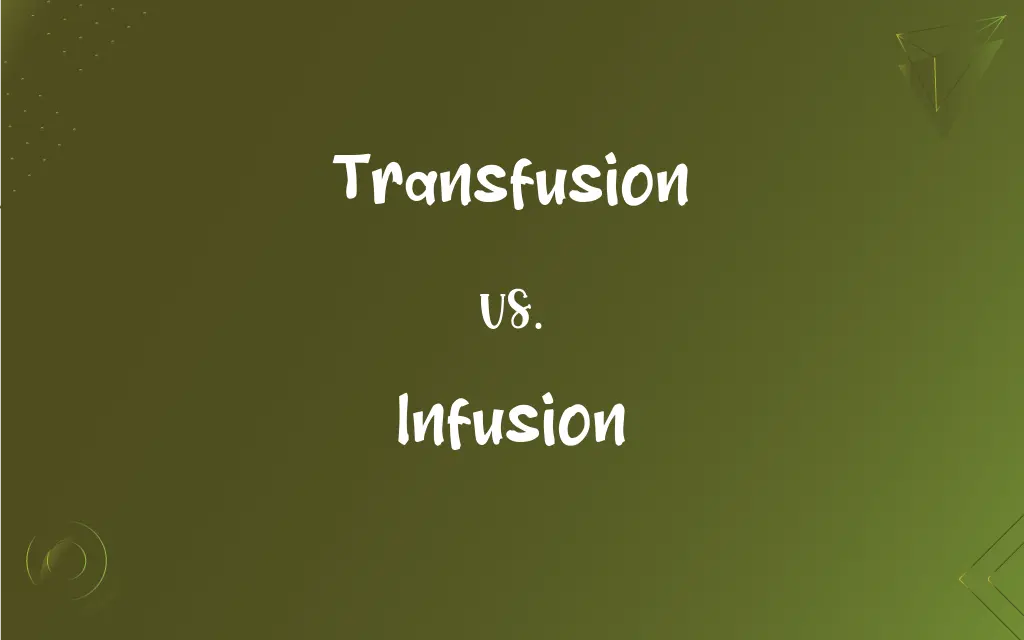Transfusion vs. Infusion: What's the Difference?
Edited by Aimie Carlson || By Janet White || Updated on October 2, 2023
Transfusion involves transferring blood or blood components directly into one’s bloodstream, while infusion introduces fluids, medication, or nutrients into the bloodstream.

Key Differences
Transfusion and infusion are distinct medical procedures, each serving unique purposes. A transfusion is a medical procedure that involves transferring blood or blood components from one person (donor) directly into the bloodstream of another person (recipient). This process is crucial for treating various conditions, such as anemia, cancer, and traumatic injuries, that lead to blood loss. Conversely, infusion is a broader term that denotes the introduction of fluids, medications, or nutrients directly into the bloodstream, usually via an intravenous (IV) line. Infusion therapy is versatile and used for hydration, administering medication, and nutritional support, encompassing a wider range of treatments than transfusion.
In the medical realm, the difference between transfusion and infusion is significant. While transfusion primarily focuses on replenishing blood or its components, infusion can involve a variety of substances, including water, glucose, and specialized drugs. Transfusion is typically a more critical intervention, required when the body cannot compensate for the lack of blood or its components. Infusion, on the other hand, may be used for both critical and non-critical interventions, such as delivering chemotherapy or antibiotics, or providing nutritional supplements or hydration.
Understanding the context of transfusion and infusion reveals their specific applications. Transfusion is indispensable in emergencies, surgeries, and chronic conditions requiring blood or blood components. The immediacy and specificity of transfusion make it vital in life-saving scenarios. On the other hand, infusion is a more common and routine procedure, used in various settings to maintain fluid balance, administer medication, or provide nutrients, making it a fundamental aspect of healthcare that can be applied in diverse medical conditions.
Examining the procedural aspects of transfusion and infusion provides further insight into their differences. Transfusion requires careful blood typing and cross-matching to prevent adverse reactions, emphasizing the importance of compatibility between donor and recipient. In contrast, infusion necessitates precise calculation of dosage and rate, considering the patient's medical condition, age, and body weight. The precision and attention to detail in both procedures underline their importance in medical practice and patient care.
Comparison Chart
Definition
Transferring blood or blood components directly into one’s bloodstream.
Introducing fluids, medications, or nutrients into the bloodstream.
ADVERTISEMENT
Purpose
To replenish blood or its components.
To administer fluids, medication, or nutritional support.
Substances Used
Blood or blood components.
Various, including water, drugs, and nutrients.
Criticality
Typically more critical, used in severe blood loss.
Can be critical or non-critical, depending on the condition.
Procedure Detail
Requires blood typing and cross-matching.
Involves calculating dosage and rate based on patient’s condition.
Transfusion and Infusion Definitions
Transfusion
A procedure transferring blood from one person to another.
The patient required a transfusion after the accident.
ADVERTISEMENT
Infusion
A method to administer drugs or nutrients intravenously.
Chemotherapy is often given through infusion.
Transfusion
The introduction of blood components into a recipient’s bloodstream.
A plasma transfusion can help clotting disorders.
Infusion
The introduction of fluids or medications into the bloodstream.
The doctor ordered a saline infusion for hydration.
Transfusion
The process of donating blood or its components.
Regular transfusions are essential for some chronic conditions.
Infusion
The process of delivering substances directly into the blood.
The patient received an antibiotic infusion.
Transfusion
A medical intervention to treat blood loss.
Emergency transfusion saved the patient's life.
Infusion
A product consisting of a liquid which has had other ingredients steeped in it to extract useful qualities.
An extract of rooibos and chamomile makes a refreshing infusion.
Transfusion
The act of replenishing the body’s blood supply.
The surgery necessitated several transfusions.
Infusion
A technique to provide hydration or nutritional support.
Nutritional infusion can aid those unable to eat.
Transfusion
The act or process of transfusing.
Infusion
The act of instilling liquids into the body.
The infusion rate must be monitored carefully.
Transfusion
(Medicine) The transfer of whole blood or blood products from one individual to another.
Infusion
The act or process of infusing.
Transfusion
(medicine) The transfer of blood or blood products from one individual to another.
Infusion
Something infused or introduced
An economy in need of regular capital infusions.
Transfusion
The act of pouring liquid from one vessel to another.
Infusion
The liquid product obtained by infusing
Prepared an infusion of medicinal herbs.
Transfusion
The act of transfusing, or pouring, as liquor, out of one vessel into another.
Infusion
Introduction of a solution into the body through a vein for therapeutic purposes.
Transfusion
The act or operation of transferring the blood of one man or animal into the vascular system of another; also, the introduction of any fluid into the blood vessels, or into a cavity of the body from which it can readily be adsorbed into the vessels; intrafusion; as, the peritoneal transfusion of milk.
Infusion
The solution so introduced
A sucrose infusion.
Transfusion
The introduction of blood or blood plasma into a vein or artery
Infusion
The act of steeping or soaking a substance in liquid so as to extract medicinal or herbal qualities.
Transfusion
The action of pouring a liquid from one vessel to another
Infusion
The act of installing a quality into a person.
Infusion
(obsolete) The act of dipping into a fluid.
Infusion
(medicine) The administration of liquid substances directly into a vein for medical purposes; perfusion.
Infusion
The act of infusing, pouring in, or instilling; instillation; as, the infusion of good principles into the mind; the infusion of ardor or zeal.
Our language has received innumerable elegancies and improvements from that infusion of Hebraisms.
Infusion
That which is infused; suggestion; inspiration.
His folly and his wisdom are of his own growth, not the echo or infusion of other men.
Infusion
The act of plunging or dipping into a fluid; immersion.
Infusion
The act or process of steeping or soaking any substance in water in order to extract its active principles.
Sips meek infusion of a milder herb.
Infusion
A solution obtained by steeping or soaking a substance (usually in water)
Infusion
The process of extracting certain active properties (as a drug from a plant) by steeping or soaking (usually in water)
Infusion
(medicine) the passive introduction of a substance (a fluid or drug or electrolyte) into a vein or between tissues (as by gravitational force)
Infusion
The act of infusing or introducing a certain modifying element or quality;
The team's continued success is attributable to a steady infusion of new talent
FAQs
Does transfusion require compatibility testing?
Yes, transfusion requires blood typing and cross-matching to ensure compatibility.
Can infusion be used for hydration?
Yes, infusion is commonly used to administer fluids for hydration.
Is transfusion only related to blood products?
Yes, transfusion specifically involves the transfer of blood or blood components.
Is the infusion versatile in medical treatments?
Yes, infusion can administer a variety of substances, making it versatile in treatments.
Are transfusion and infusion interchangeable terms?
No, transfusion involves blood or blood components; infusion involves fluids, medications, or nutrients.
Can transfusion treat anemia?
Yes, transfusion can be used to treat severe anemia by replenishing red blood cells.
Is transfusion critical in emergency scenarios?
Yes, transfusion is critical in emergencies involving significant blood loss.
Can infusion be used in chemotherapy?
Yes, infusion is a standard method to administer chemotherapy drugs.
Can infusion deliver medication?
Yes, infusion is a common method to administer medications directly into the bloodstream.
Does infusion require precise calculations?
Yes, infusion requires precise calculations of dosage and rate based on individual patient needs.
Can infusion treat infections?
Yes, infusion is often used to administer antibiotics to treat infections.
Can infusion provide nutritional support?
Yes, infusion can be used to provide nutritional support to patients who cannot eat.
Does transfusion involve different blood components?
Yes, transfusion can involve whole blood, red cells, plasma, or platelets.
Is infusion used in pain management?
Yes, infusion can be used to administer pain medications.
Can infusion rates vary?
Yes, infusion rates can vary depending on the substance being infused and patient needs.
Can anyone donate blood for transfusion?
Eligibility depends on various factors, including health, travel history, and lifestyle.
Is transfusion used in surgeries?
Yes, transfusion is often used in surgeries to compensate for blood loss.
Can infusion be a routine procedure?
Yes, infusion can be both a routine and specialized procedure depending on the context.
Can transfusion transmit infections?
The risk exists, but rigorous testing minimizes the risk of transmitting infections through transfusion.
Are transfusions lifesaving?
Transfusions can be lifesaving in situations of severe blood loss or deficiency.
About Author
Written by
Janet WhiteJanet White has been an esteemed writer and blogger for Difference Wiki. Holding a Master's degree in Science and Medical Journalism from the prestigious Boston University, she has consistently demonstrated her expertise and passion for her field. When she's not immersed in her work, Janet relishes her time exercising, delving into a good book, and cherishing moments with friends and family.
Edited by
Aimie CarlsonAimie Carlson, holding a master's degree in English literature, is a fervent English language enthusiast. She lends her writing talents to Difference Wiki, a prominent website that specializes in comparisons, offering readers insightful analyses that both captivate and inform.































































